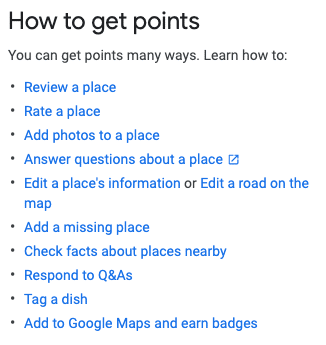When Google launched Local Guides some years ago, few of us could have realized what level of impact this program would have on the local search ecosystem, and even if we had, I’d like to have thought it would be a positive one.
After all, getting real-life humans to contribute their opinions and time to make Google Maps more useful and accurate is a lofty and admirable goal, right?
Sadly, having spoken to several high-profile members of the local search community, including some Google My Business Product Experts (skilled users certified by Google as having exceptional and in-depth knowledge of their products), the current picture is far from optimistic. It seems that the professional perception of Google Local Guides is one of bad actors, gamification, abuse and misuse, as you’ll see in the examples and quotes below.
What is a Local Guide?
But let’s just back up for a second. For the uninitiated, a Google Local Guide is a Google user taking part in a program of activity that rewards them for frequent contributions to Google Maps. Users tend to skew towards Android smartphone owners due to the in-built Google access via their devices, but the program is available to anyone with a Google account and access to the Google Maps app.
The premise is very simple: every contribution (submitting a photo, writing a review, answering a Q&A question from another user, choosing an attribute for a business/location you’ve visited, suggesting an edit to a Google My Business profile, etc.) is worth points.
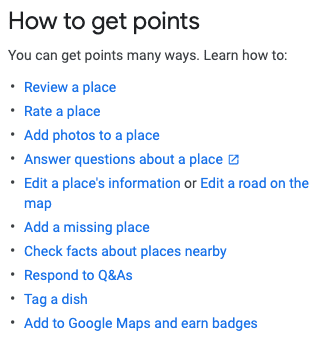
The more points you get, the higher your Local Guide ‘Level’ becomes, and each level unlocks rewards, such as membership of Google One, or cinema tickets.
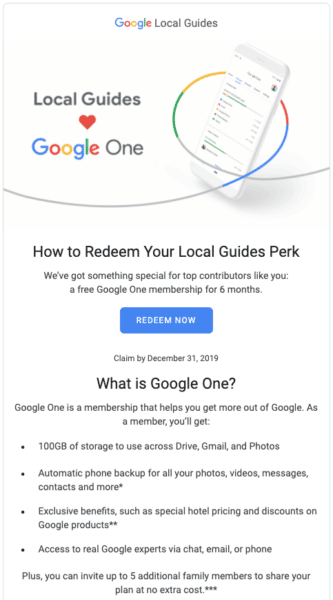
Google uses this gamification to get more contributions from users, and cleverly ties this in with gamification of other areas of your life that Google monitors through your connected devices, such as travel.
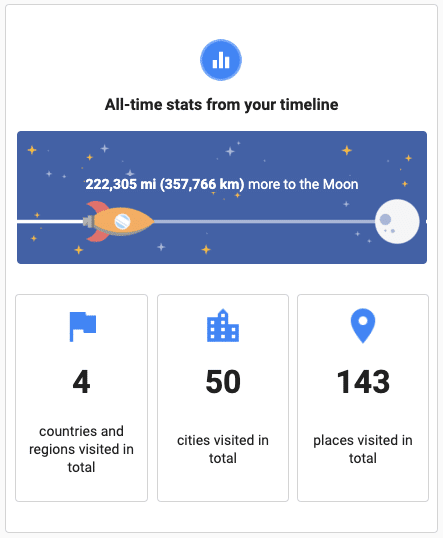
However, the issue I’ve discovered through my research for this piece is that more does not equate to better. In fact, Local Guides seem to be having the exact opposite effect to the one intended.
In my conversations with local search professionals who have plenty of first-hand experience with Local Guides, a few common threads of issues appeared.
‘Gamification encourages behaviors to gain points for the sake of gaining points’
I’ve talked about the gamification of Local Guides above, but it’s really worth pointing out what a flawed system it can be when not applied correctly. Plenty of gamification systems take the form of “badges” that are won when the user achieves a set goal, and Google Local Guides is no different.
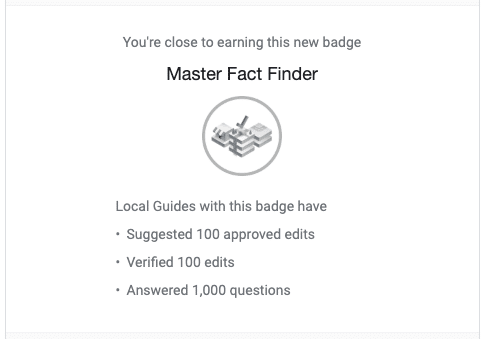
However, these badges aren’t publicly visible and would not be likely to instill trust in the Local Guide from other Google users. The thing that is most visible aside from your posted contributions is your “level,” which consumers are far more likely to equate with trust.
Google My Business Product Expert, Steady Demand’s Ben Fisher has strong opinions on this aspect of the Local Guides program:
“Personally, I have not liked the system ever since it was put into place. It is too easy to manipulate. The Local Guides program was instituted with an incentivized, point-based system, which rarely gives out real-world rewards (the points mainly translate to ‘levels’). There are drawbacks to gamification. The first is that it makes a user feel like they have more power (they don’t) and encourages behaviors to gain points for the sake of gaining points.”
“I once heard a user tell me that they would do ‘check the facts’ and select ‘not sure’ on every answer, just so they could gain points.”
Local SEO Guide’s Andrew Shotland agrees, saying: “I am a Local Guide myself, and while I’d like to think that I generally leave helpful reviews, I find Google’s incentivizing Local Guides to leave reviews with things like movie tickets automatically makes the whole program suspect.”
‘I almost look at non-Guide reviews as more legitimate’
Although he understands why gamification was used in this program, SearchLab’s Greg Gifford believes that it has resulted in the exact opposite of the intended effect:
“The idea is awesome, but the implementation has completely destroyed the value of the program. I get why they gamified things; it keeps people interested and active. But it ended up ruining the integrity of the contributions.”
“This is especially clear when you look at Google My Business Q&A. Local Guides were awarded tons of points for answering questions, regardless of the value of the answers. I’ve seen a massive number of super short 1-4 word responses to questions, and an inordinate number are snarky and completely irrelevant to the question.”
To illustrate Greg’s point, I took a short browse around Google Q&As for businesses. It didn’t take long to find a slew of misleading, unhelpful or sarcastic, Local Guide-submitted responses to questions, and all for a single luxury chain.
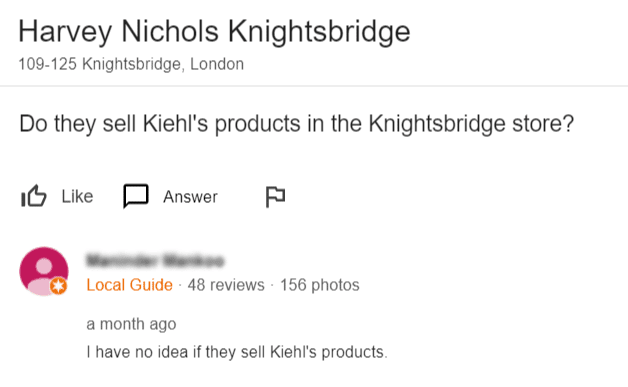
This first example, above, sums up the perils of poorly applied gamification perfectly. This is what happens when saying “I don’t know” still nets a reward.
At least the Local Guide below passed on the question but offered a different route to the answer (still completely useless to everyone else, though).
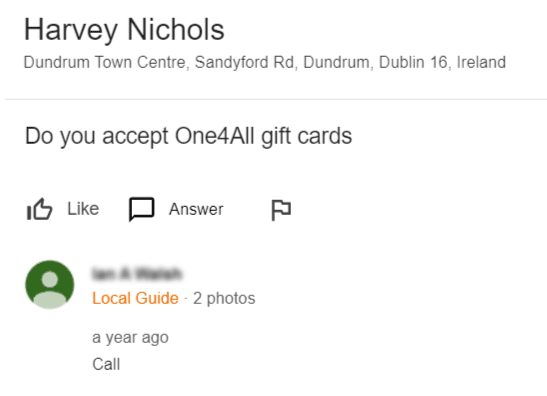
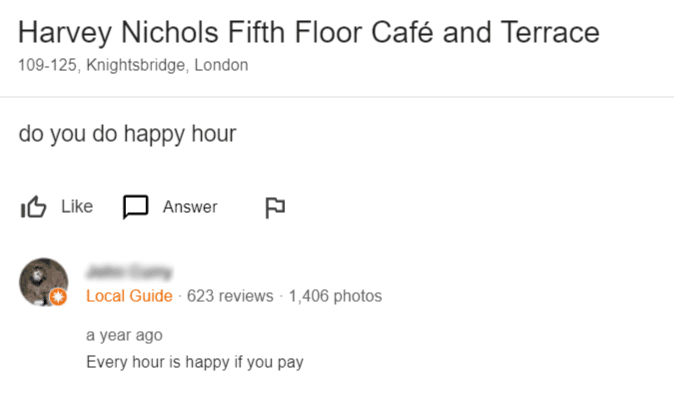
I found plenty more but figured I’d end this interlude with this example of Local Guide snark. (Why is it that the Local Guide veterans are more likely to be sarcastic in their responses?)
Gamification can ultimately lead to quantity far outweighing the quality. As Greg points out, “Since they’re awarded points, they upload tons of photos and write tons of reviews. While a few people in the program legitimately try to be helpful and write incredibly detailed, helpful reviews and upload quality photos, far too many people just go through the motions to get the points.”
Here, Greg has probably the most damning thing to say about Local Guide contributions: “I almost look at non-Guide reviews as more legitimate because they’re left by someone who truly wanted to leave a review, rather than by someone who was vomiting out reviews just to get a few more points in the system.”
‘There’s a myth that a Local Guide account and points lead to a higher authority in edits beings accepted’
The lure of the game isn’t the only reason Local Guides make contributions at a Gatling-gun pace. There’s a commonly-held belief that having a high level in the Local Guides program gives you more authority to get your suggested edits to Google My Business profiles approved – a huge boon for any local SEO looking to tidy listings quickly or for bad actors to cause chaos amongst their competitors.
As Online Ownership’s Tim Capper (another Google My Business Product Expert) explains:
“I spend countless hours trying to help businesses get to grips with their business listings on maps, so I tend to have a more negative view of the Local Guides program.”
“There’s a myth that a Local Guide account and points lead to a higher authority in edits beings accepted. This is wrong – all information edits go through a check before being accepted.”
Ben Fisher continues, “While it’s true that edits are tied to your whole Google account, it is the consistency and reliability of your edits that truly give you influence. There are a series of checks and balances that allow factual edits to grant you more trust. I have seen edits from a Level 3 guide get accepted immediately and those from a Level 8 guide go into a ‘not applied’ status immediately.”
‘The Local Guide badge is a hint that we use to find spammers’
If you thought the reputation of Local Guides within the local search community couldn’t be more tarnished, think again. For some the designation is one that actually helps eke out spam and fake reviews on Google Maps and Google My Business because these practices are so prevalent among users of this type.
Google My Business Product Expert, Postali’s Dan Foland deals with spammers every single day. Here’s what he had to say about his experiences with Local Guides:
“To the ordinary user, the badge that Local Guides display seems like a symbol of trustworthiness, but to those of us who have to deal with spam and fake reviews on a daily basis, the Local Guide badge is a hint that we use to find spammers.”
“Since the criteria to become a Local Guide is entirely based on the quantity of actions taken (rating/reviewing a business, suggesting business edits, etc.) rather than quality, it’s extremely common for bad actors to become a Local Guide.”
Ben Fisher adds, “Companies that sell reviews will create tons of fake accounts, do ‘check the facts’ to gain a few levels, then start writing fake reviews, because 200-word reviews give more points. So we commonly see that fake listings generally have 3-4 fake reviews from Local Guides. And if you look at the guides’ profiles, they seem real enough until you dig in and look at the avatar and the review patterns.”
Here’s a great example of the review patterns Ben mentions, shared with me by Sterling Sky’s Jason Brown (another Google My Business Product Expert):
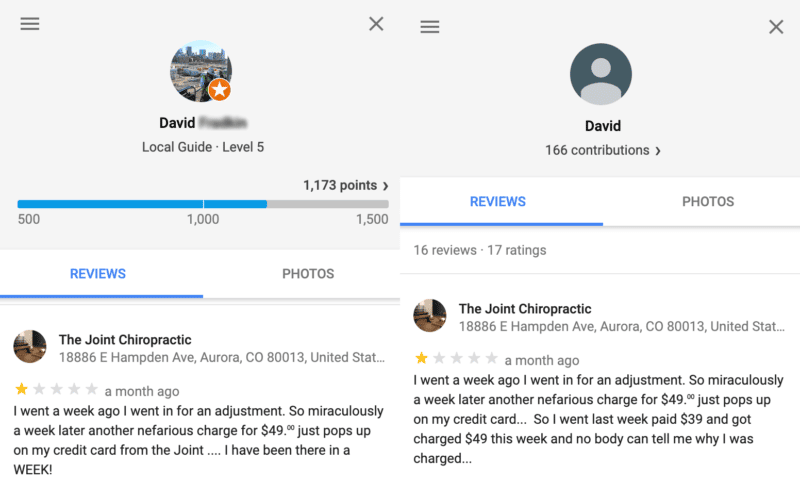
Here a Local Guide has left a negative review for a business, and at the same time a suspiciously similar review has appeared, written by someone also just happens to share the Local Guide’s first name.
I talked to Blake Denman from RicketyRoo about the sorts of people who actually chase levels in the Local Guides program:
“To me, the goal of Local Guides is altruistic by attempting to get everyday people some type of status in their local community. The thing is, influencers get paid and don’t really care about what level ‘guide’ they are. The only people that truly care about their Local Guide level are the ones who are actively trying to game the system to profit off of it.”
This is the crux of the issue. The rewards are minimal and the ego trip negligible, so we are left with one overriding motivation: the perception of Local Guides is a trusted source of information and therefore it’s a badge that greatly appeals to those with bad intentions.
With all this negativity around Local Guides, is Google doing much to resolve the issue and restore faith in the program? Well, depending on who you speak to, yes and no.
‘Bad actors can make a real mess of things before a human or machine ever notices’
While Google My Business Product Expert Joy Hawkins (from Sterling Sky) has good things to say about the new features in the program (“Google is definitely trying to push the program with their recent launches of profile descriptions and adding a follow feature.”), she reserves her praise for an update that attempts to stamp out spam:
“One thing I am excited about is the new ability to report Local Guides who are spamming businesses.”
Ultimately, though, Joy thinks the program is “a bit overrated, in the sense that anyone can become a Local Guide and there are no real benefits to being one.”
Jason Brown certainly agrees about the new features, saying “It is interesting that Google is now allowing users to follow or block Local Guides and to see what places that they recommend. Is this Yelp Elites on steroids? Is this Google’s new addition to social?”
But is it ‘too little, too late’? Is Google’s move to allow people to crack down on Local Guides, whilst simultaneously giving the Guides themselves more power and influence, really going to lead to a reduction in spam? Tim Capper is skeptical:
“Now there is a Local Guide site, but this is ineffectual at best in reporting rogue users. In fact, you get told off if you post the user’s account into a report on the forum. Equally, the program is understaffed, so a report can go for months without being answered by a human.”
“This tells me that Google feels the program is working with not enough bad data in the entire maps contribution data set to warrant closer monitoring, which means that bad actors can make a real mess of things before a human or machine ever notices.”
‘Google doesn’t want to acknowledge that they have a serious problem’
The number of Local Guides grows every day, as do the sometimes spammy and often unhelpful contributions they make. With so much negative opinion around Local Guides, it feels like consumer contributions and community opinion is another part of the local search ecosystem that Google has handed over to the spammers.
Is there anything that can be done? Has the rot spread too far or can the good guides save the day?
While I don’t have any answers, I can only hope that sharing the consensus above can help to reframe the conversation around Local Guides in a way that educates consumers and asks them not to put too much faith in them – at least until the program is cleaned up.
I’ll end with a quote from Dan Foland, who describes the dichotomy at the heart of the issue succinctly and powerfully:
“Google doesn’t want to acknowledge that they have a serious problem with Local Guides, fake reviews, and spam. The average user has no idea that the Local Guide badge doesn’t take into account quality, trust, or anything else besides the number of actions taken.”
“Ironically, the more fake reviews and spam a user submits, the more likely they are to become a Local Guide.”
No, actually… it’s the holiday season so I’ll end on a lighthearted note: a celebration of everything Local Guides and a testament to the power of user-generated content.
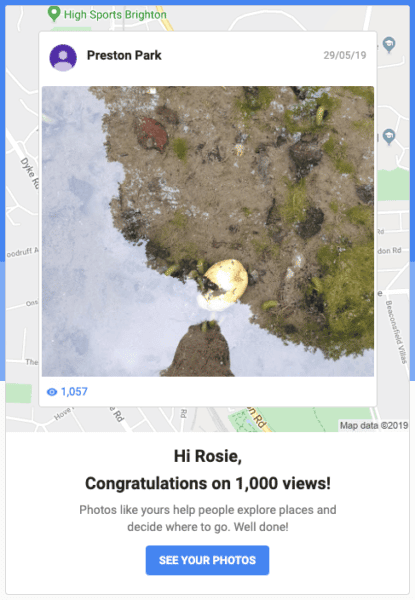
A potato in a park.
Seen by 1,000 people.
The post Good guides gone bad: How Google’s ‘Local Guides’ program fails businesses and consumers appeared first on Search Engine Land.
Source: IAB

